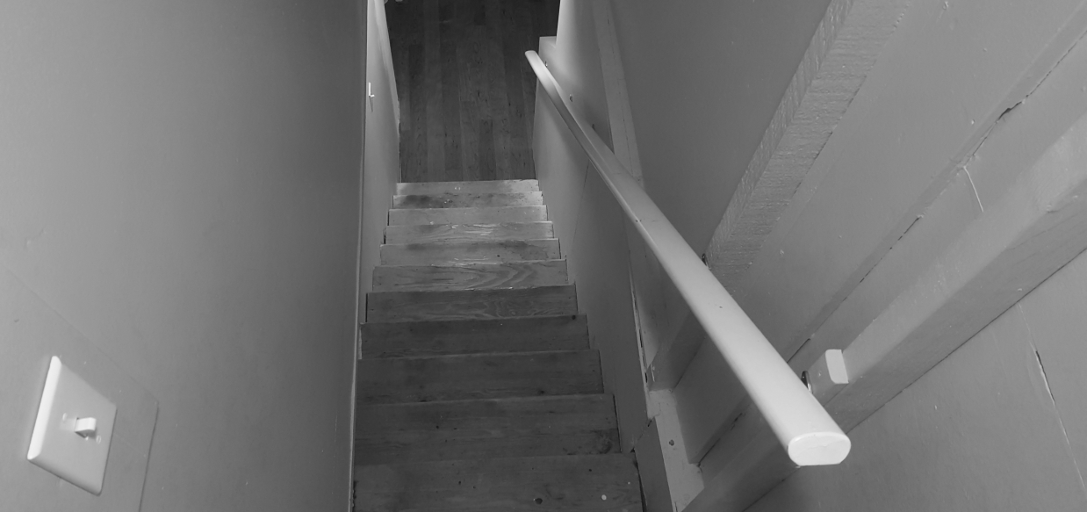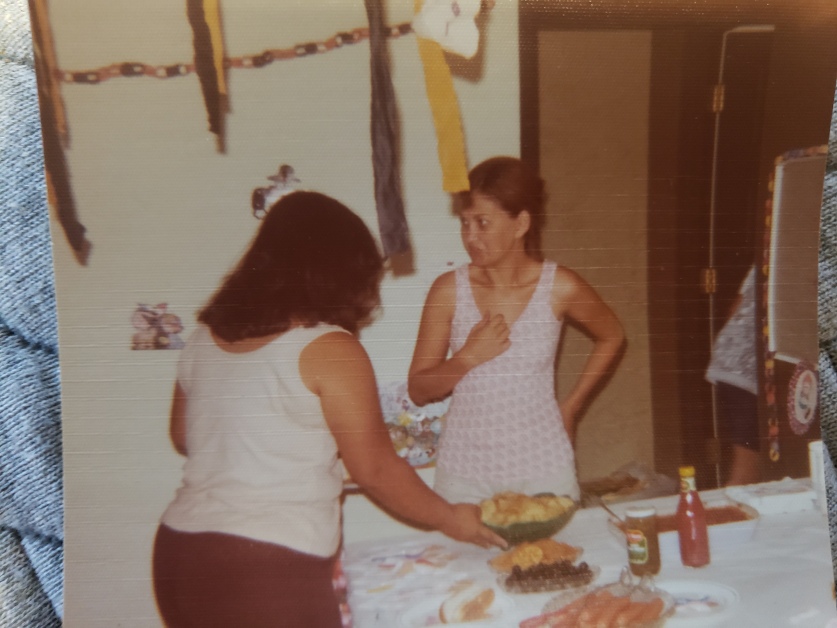Trigger Warning: suicide, self harm, stillbirth, abuse
“How was therapy?” Ian asks. He asks this after every session, but this time is different. He is worried about me.
“It was horrible,” I huff. “Although she reminded my why I’m so freaked out about the stairs, so I guess she earned her keep.”
I say words casually enough, but we both know it is a ridiculous understatement.
Ever since we finished the remodel and moved our bedrooms into the basement I’ve been sinking into a bog of anxiety. Our house was originally a modest one-story bungalow, not built to accommodate an internal staircase. When some previous owner decided to expand their living space into the root cellar and attic, joists were cut and stairs were wedged into a narrow bedroom closet.
Well, only a few joists were cut. There’s one in particular that can’t be cut so we have to lean backwards to get down the stairs to avoid hitting our heads. What’s more, the treads are so short that my toes hang over them by a good two inches even when I’m barefoot. And the risers are so high that my old personal trainer actually raised the resistance on the stair climber when I told her about them.
But I’m not bogged down by our stairs just because they’re steep. Or narrow. Both of those things are real attributes of my house’s staircase, yet I have a reaction to them that no one else seems to. Everybody who’s been to our house knows about our steep stairs. Nobody has refused to use them. Nobody else sees them quite as terrifying as I do.
That’s because nobody else stands at the top of my stairs struggling with my mental illness.
My mental illness is an endless loop of awful brain chatter (the world would be better off without you) trying to get in between all of the totally normal brain chatter (wow, these stairs are steep). Sometimes it’s really tough to see the line between awful and normal. Most of the time, illness finds its way inside using normal chatter, then pulls a heinous bait-and-switch (these steep stairs seem like a great way to make the world a better place…without you). But it switches them slowly, over weeks or even months, so I can’t always detect where my head’s gone awry. And for extra fun, ignoring the chatter is a constant energy drain. The more I ignore, the less energy I have to fight. The louder, the brasher, the more dangerous they get.
I thought I knew this about myself. That five years of therapy, of the practice of talking about my shit with a person who spent those same five years trying to see through it, meant I could see things coming.
I talk to my both Ian and my therapist about my staircase anxiety on the regular. We’ve worked through practical plans to get bulky laundry baskets up and down. About hand rails and anti-slip tread stickers. Proper lighting. I thought our progress was going well.
I also thought I was doing well, what with all the going upstairs I was managing to accomplish on a daily basis. (Yay me.) I thought talking about my anxiety on the regular meant I was being responsible and self-aware. I honestly thought I had accepted my mental illness and was working through it. That I had licked my suicide ideation because it wasn’t jangling every single day.
But just when I thought I was winning the fight, I found myself teetering at the top of the basement stairs. Heart thudding, I realized that without even thinking about it I was leaning precariously over the awkward chasm below. Head rolling with vertigo, I envisioned a nasty, broken-bones fall down the stairs . My ears rang with the imaginary thudding of my body against the wooden steps; the crack of my head into the floor joist jutting out just so. The images replayed in my head until I couldn’t remember why I was at the top of the stairs in the first place.
Then came the yelling of brain monsters whose whisperings I had been ignoring so hard I didn’t even think they were there. Do it, they said, goading me into self-destruction. Listing reason after reason why I should. Their reasons all seemed so sensible, too. I was running out of reasons why they were wrong.
And so it was that I found myself suddenly aware I was actively being mentally ill. I sat down at the top of the stairs and texted Ian, who left work twenty minutes early to take care of the kids. To take care of me.
Then came the anger, self-directed of course. Anger at having this thing inside my brain. My life is good, my marriage is solid, my children are amazing. Why do I insist on thinking of all of these horrible, horrifying things, when I ought to be happy? I have so much to be grateful for, yet here I am ruining it all with my sick negativity. Ruining things for the kids, ruining things for Ian. I’ve ruined every relationship I’ve ever had with this garbage-filled attitude of mine.
Why?
Ian came home, fed me dinner and put me to bed. I cried and was ashamed of being so wound up about something as seemingly benign as a set of stairs. As grateful as I was to have him be there, I knew it wasn’t an actual solution. He needed to work, after all. And I needed to be able to get around my own home.
I was relieved that I had a therapy appointment the next day. I imagined blurting out everything I was thinking, narrating the negativity, self-harming spiral I needed to escape. But once I sank into my therapist’s sofa I couldn’t bring myself to say a word about my moment at the top of the stairs. I knew this was exactly the reason I go to therapy in the first place, but the words stalled. I was anxious, and so very ashamed. Telltale brain monsters whispered that there were so many other things to talk about anyway so it would be okay to not bring this up right away. We can wait until next week. We can wait until never.
It was tempting to believe them because it was rooted in a kernel of truth after all; there were so many other things to talk about. So many things that bring me back to therapy each week. But none of them were immediate. None of them had brought my husband home early because I needed help navigating the threat of my own house.
Reluctantly, I forced myself to begin telling her what had happened the day before. She asked some questions and I answered, but my words remained guarded. Evasive. Despite our history I wasn’t sure how much I wanted to tell her. Or why I would want to anyway. The brain monsters continued whispering, suggesting a thousand different subject changes. I considered each and every one.
We sat in silence for awhile, my therapist giving me the chance to bridge the gap between us. When I didn’t, she shifted in her seat and gently reminded me of two things I’d brought up in previous sessions.
The first was a recurring dream I’ve had for as long as I can remember. My childhood home is burning and I had to jump over our flaming, falling away staircase. In those dreams, I always die. Sometimes I die right away. Others, I lie broken on the stairway landing while the flames inch closer to my feet. Always my feet. And in those dreams, I am always seven years old.
I nodded thoughtfully. Yes, those dreams had started up again. But I dismissed them as dreams. Just dreams. They can’t really hurt me, of course.
“And I’m remembering you mentioning the time your mother -” she said, and I looked up sharply. I knew what she was going to say and I flushed with intense shame at having forgotten this memory in all my spiraling hullabaloo.
“- pushed you down the stairs?” she finished.
“Threw me,” I corrected. We sat in another uncomfortable lapse of silence. But this silence wasn’t one of evasion; it was one of searching.
I’ve always had trouble remembering the details of this incident, though it looms large and heavy in my adolescent mind. It’s always felt strange to have something so important and foundational get lost in the dark fog of forgetfulness. To simultaneously know and not know that something bad had happened.
What I do remember is lying in my bedroom one afternoon and barely looking at my brother as he stood in my doorway. He said Mom wanted me downstairs and I gave him some smart-ass reply. Moments later there was the terror of flying over threadbare green carpet, same as in my dream, only this time my mother loomed furious behind me. She was somehow both dragging and throwing me down the stairs until we reached the bottom. She pushed me into the living room where I stumbled into the metal rails of my father’s hospital bed. I remember looking into my father’s disappointed eyes. And then, nothing.
Well, not exactly nothing. I don’t remember events after that, only feelings. The penetrating shame of knowing that I’d been tossed down the stairs because I didn’t want to get out of bed and do whatever it was my mother had asked me to do. Of knowing my quadriplegic father would give anything to get out of bed and do anything any one of us asked. That my mother just needed me to clean the goddamn rabbit cage like I swore up and down I would do every day when I begged and begged her to let me get one. That I had gone back on my promise and then had mouthed off to her about it when she was too busy looking after Dad to deal with me and the rabbits, too.
I remember thinking of course my mother throw me down the stairs. It’s where I should have been all along.
“How old were you?” my therapist asked.
“Thirteen? I’m not exactly sure.” And after a moment, “I really made things so much harder for my mother.”
We talked a little more, about why I think a thirteen year old child could have deserved to be thrown anywhere, but especially down a staircase. I was adamant, unwavering about this assertion. Not about any other thirteen year old, of course. Only me. I deserved it. I was absolutely awful. I had evidence of that. Proof. So much proof, from every single year of my life.
This fundamental sense of deserving to be hurt is why my brain has told me for years to hurt myself. To cut and burn and starve myself again and again. Why I stayed with a man who repeatedly wrapped his hand around my throat and lifted me off the ground. Why I’m still not particularly convinced he was wrong to do it. I know how horrible I was to him, too.
The session ended before we could really delve into the whys and wherefores of self-hatred and blame. I wondered if it would even be possible to dig enough and uproot it, my most hideous and widespread core belief.
Being reminded of the dream, of being thrown down the stairs and coming face-to-face with my father’s illness, opened a doorway into the deep cellar of my predisposition towards self harm. Let a sliver of light in there. A sliver of truth that helped me see just how dark and terrifying the top of the stairs are for me.
I’d been clinging to the fantasy that being years removed from my last self harm episode meant I was healed. Teetering at the top of the stairs shocked me out of my denial. Made me realize I hadn’t actually been healed; was merely stable. That my basement staircase isn’t just scary. It’s actually triggering my mental illness.
Yes, the illness told me to throw myself down the stairs. But the illness itself has always been rooted in trauma. In a whole traumatic stretch of years in my life that I have never really processed. From which I have never really healed. The illness may look like me having a moment of self-destructive vertigo at the top of my basement stairs, but that is just a symptom. To heal the illness, I must first heal the trauma. Look at it, unflinching.
Or, at least, I have to try.
I tell Ian about my session. All of it. With him the words are not guarded, even though they may be halting.
“So what do we do?” he asks quietly when I’m done.
I sigh deeply. “I don’t know.” I wish I did.
He pulls me into a bear hug and resist. I feel too awful, too wrong, to be this close to anybody. But he presses me to him anyway and I leak tears onto his chest. I try to pull away, embarrassed about leaving a face print on his sweater. He just washed it yesterday. Instead of letting go, he kisses the top of my head.
“Whatever you need, we’ll do it,” he says. “If we have to move, we move. If we have to…anything. We’ll do it.”
I know he means it, even I don’t know why. Even if I don’t agree.
“I need to not be sick,” I whisper into his shoulder.
“It’s not your fault,” he says and I shrug in his embrace.
I know he means that, too, but it’s going to take a lot of work for me to believe it.




Ian is wonderful. I love him, because he takes good care of my friend.
<3 He is very wonderful.
I just need to say that I read this and resonate with so much. You’ve talked about some things that are really hard for me to articulate for myself.
If you ever feel up to talking more, let me know. I’m here.